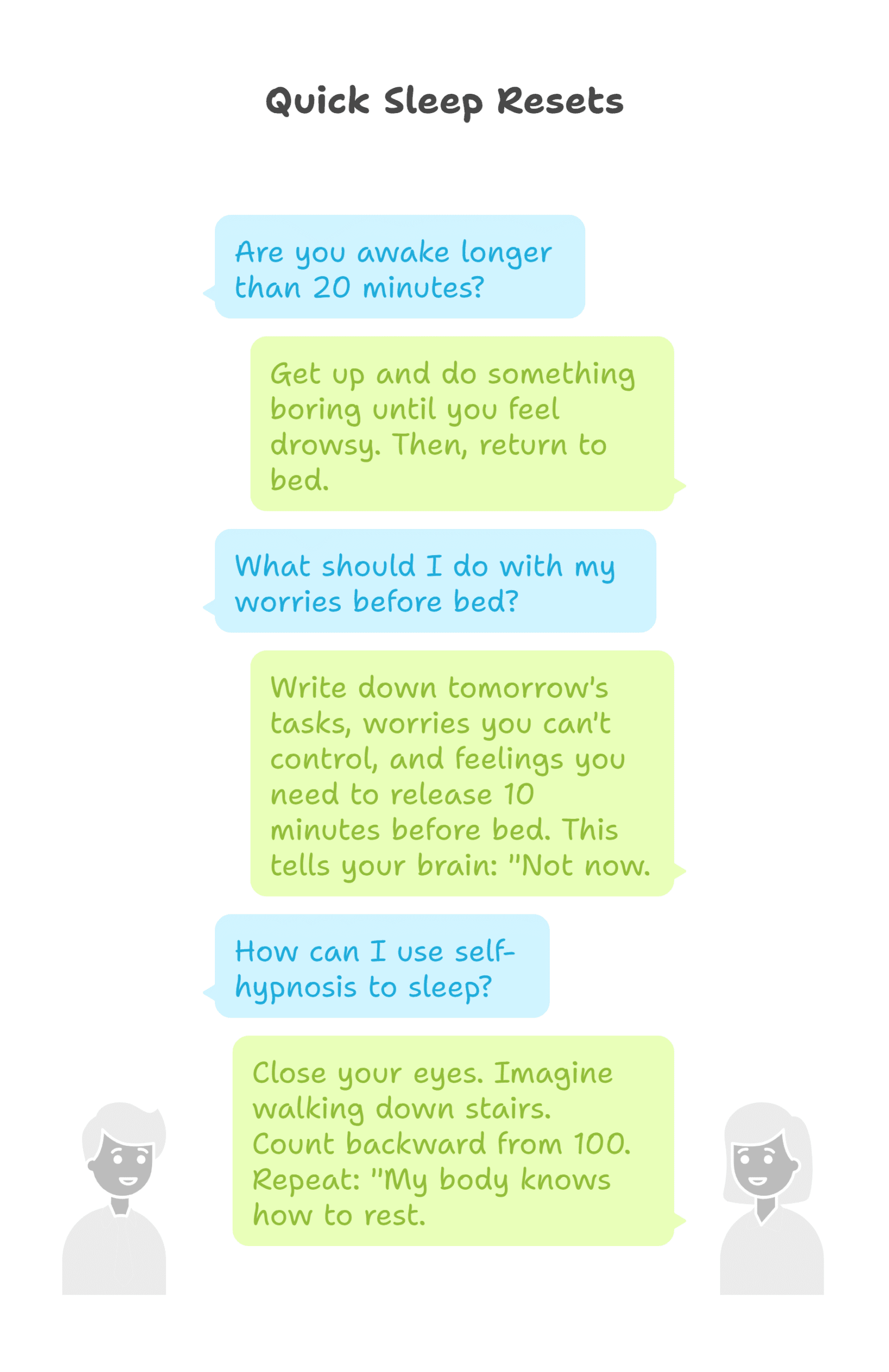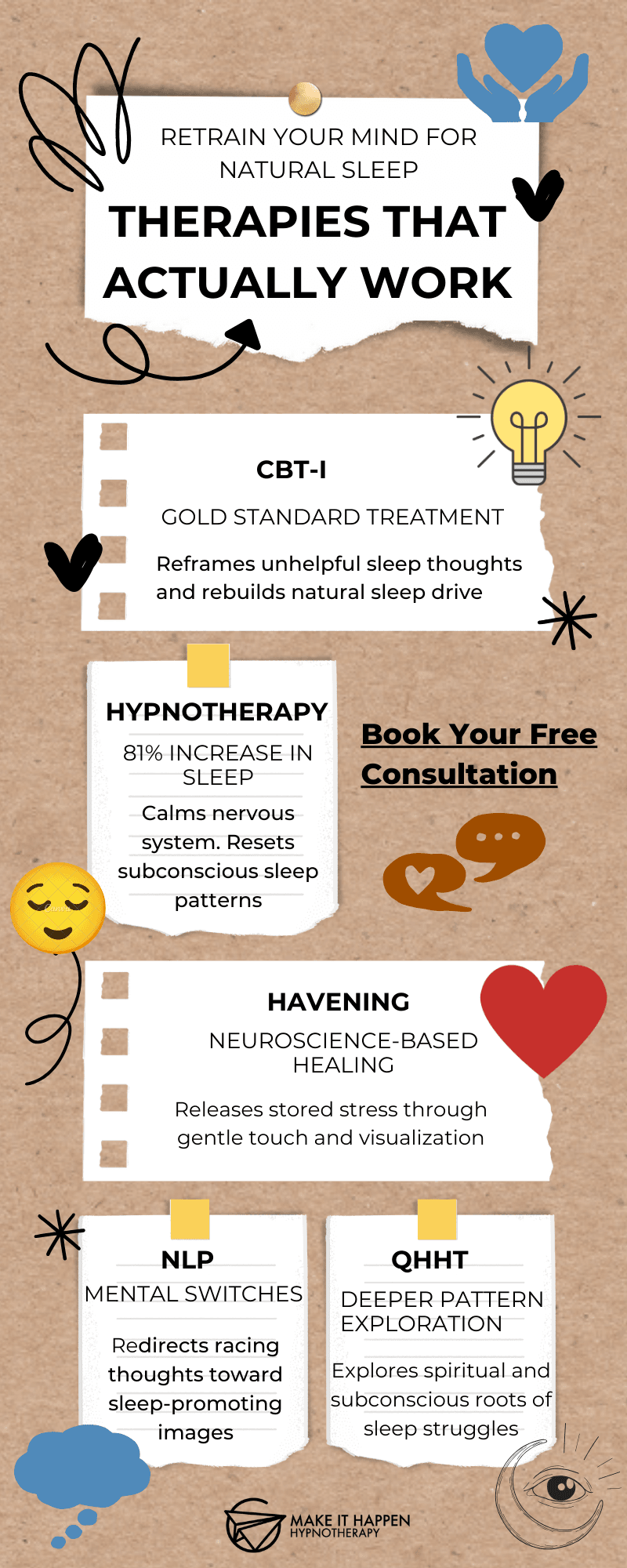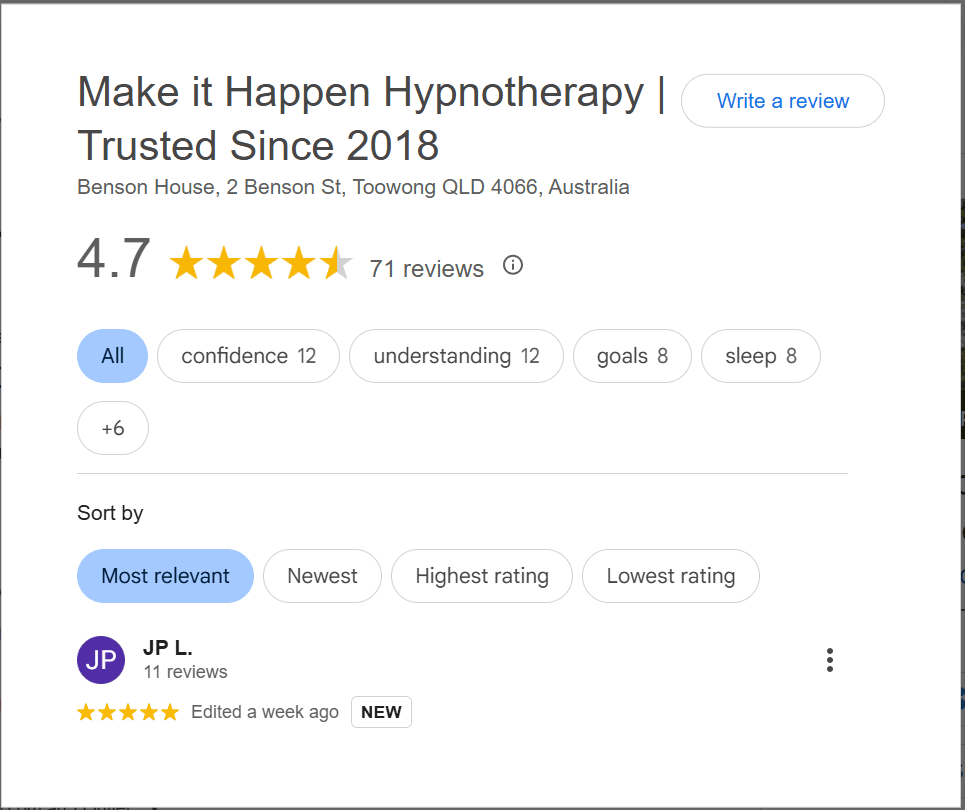It is 2:00 AM. You are exhausted, but your brain hums with thoughts:
- Work deadlines
- Family worries
- Random “what ifs”
If you often lay in bed for hours can’t sleep, you have probably whispered to yourself: “Why can’t I sleep?”
You are not alone. You are overwhelmed. It is completely normal to feel frustrated, even hopeless, when sleep won’t come. Many people blame themselves. nonetheless, sleeplessness is not a personal failure. It is your mind and body asking for a new kind of support.
This guide explains:
- The hidden reasons your brain won’t switch off.
- Why common advice often doesn’t work?
- The deeper approaches that actually restore natural sleep.
You will also find practical things you can try tonight.
*clients’ names have been changed due to privacy.
Quick Wins You Can Try Tonight
You want relief, not theory when you are exhausted. Here are three methods you can use immediately:
- The 20-minute rule: Are you awake longer than 20 minutes? Get up and do something boring until you feel drowsy. Then, return to bed.
- The “worry appointment”: Write down these things 10 minutes before bed:
- tomorrow’s tasks
- worries you can’t control
- feelings you need to release
This tells your brain: “Not now.”
- Simple self-hypnosis: Close your eyes. Imagine walking down stairs. Count backward from 100. Repeat: “My body knows how to rest.”
These quick resets calm your mind so sleep has a chance to come naturally.

The Sleep Struggle Millions Share
Research shows nearly one-third of adults regularly experience sleep problems. About 15% meet the criteria for insomnia severe enough for medical diagnosis.
Bella’s story: “I am a project manager and a mother too. At 3 AM I would replay tomorrow’s meetings while worrying about my kids. Knowing that so many people experience the same thing made me feel less like I was failing—and more like I was simply human.”
The toll of poor sleep doesn’t only tires you out. It affects:
- Mood
- Relationships
- Immunity
- Stress resilience
Also, you get stuck in a cycle. Anxiety makes you sleep poorly. Lack of sleep increases anxiety. It is like rinse and repeat.
Why Can’t I Sleep Even When I am Exhausted?
Here’s the kicker: sleep problems aren’t limited to what happens at night. They are rooted in how your nervous system and subconscious process stress all day long.
Have you ever thought, ‘Why can’t I sleep like everyone else?’
Know this: nothing is wrong with you.
Your brain is simply trying too hard to protect you. It is keeping you awake in doing so.
Your Body Stuck in “Alert Mode”
Think of your nervous system like a car alarm that is overly sensitive. Stress hormones (cortisol) often spike at night instead of winding down when you have insomnia.
Hormones can complicate things further—especially for women during perimenopause and menopause. Changes in estrogen and progesterone can disturb the brain’s calming signals.
Modern habits make it worse. Evening screen time tricks your brain into thinking it is still daytime. This delays melatonin production for hours.
When Your Mind Refuses to Switch Off
Daniel’s story: “I used to check work emails at 11:30 PM thinking I was getting ahead. Instead, my brain revved up. Bed time became work time.”
Research shows that racing thoughts can predict insomnia. The harder you try to force sleep, the more alert your mind becomes.
Common causes include:
- Late-night work emails
- Social media comparisons
- 24/7 news cycles
- Guilt about “wasting time” on rest
The Subconscious Overload
Here’s what doctors rarely mention: distractions keep you from facing deeper worries during the day. In the quiet of the night, your subconscious sees its chance to “process” all the unspoken stress.
Sandra’s realisation: “At 3 AM my brain wasn’t just keeping me awake—it was trying to solve every family problem at once. It thought it was helping, but it was ruining my sleep.”
Your subconscious might even see sleep as unsafe if you have chronic stress or trauma. Why? Because sleep means letting go of control.
Why Common Sleep Advice Falls Short?
You have likely tried the basics:
- Cooler room
- Better mattress
- No caffeine after lunch
These help some, but they don’t address the core problem—an overactive nervous system and anxious subconscious.
- Sleep medications can help short term but many people develop:
- Tolerance
- Rebound insomnia
- Dependency
- Supplements (melatonin, magnesium, herbal teas) can take the edge off but rarely resolve chronic patterns.
- Sleep hygiene tips are useful foundations. However, no amount of dim lighting helps if your “internal fire alarm” is still blaring.
If you have already tried the usual advice and still lay in bed for hours and can’t sleep, that doesn’t mean you are beyond help. It means you need deeper approaches designed for people exactly like you.
Therapies That Actually Work
Lasting change comes from approaches that retrain both your conscious mind and subconscious patterns.

Cognitive Behavioural Therapy for Insomnia (CBT-I)
Sleep experts recommend CBT-I as the gold standard of treatment. It helps you:
- Reframe unhelpful sleep thoughts (“I must get 8 hours” → “One rough night won’t ruin me”)
- Rebuild your natural sleep drive
- Re-teach your brain that bed equals rest—not worry
Research shows CBT-I creates lasting changes, often more effective long term than medications.
MIHH Success Story: In our 7 years of practice, we have helped 800+ clients overcome sleep struggles. Our client Mandy went from lying awake 4-5 hours nightly to falling asleep within 30 minutes after just 6 CBT-I sessions.
Hypnotherapy: Resetting Subconscious Patterns
Hypnotherapy guides you into a calm, focused state where we can access the subconscious mind that keeps replaying worries at night—to reveal the root cause of poor sleep (e.g., unresolved anxiety, past experiences). Then, through gentle reprocessing and new conditioning. Hypnotherapy helps your body rest naturally as it calms the nervous system and reframes subconscious patterns, so you can fall asleep faster, stay asleep longer.
One study found hypnotherapy increased deep sleep by 81%.
Liam’s story: “CBT-I gave me tools, but hypnotherapy was the game-changer. It helped my subconscious understand that hyperalertness wasn’t protecting me—it was preventing rest.”
Havening: Healing Sleep-Blocking Stress
Havening is a gentle, neuroscience-based technique. It combines soothing touch with calming visualisation. It helps your brain release past stress by stimulating specific nerve pathways. As a result, you can shift into a deep state of safety.
Insomnia isn’t just about “bad habits.” It is an overactive alarm system in the brain. Havening essentially tells that alarm: “You are safe now. It is okay to rest.”
Maya’s story: “After a car accident, I would wake at 2 AM with my heart racing, terrified for no reason. Havening gave me a tool I could use right in bed. Within weeks, I wasn’t waking with panic anymore—I was waking rested.”
NLP Tools for Racing Thoughts
NLP (Neuro-Linguistic Programming) gives you practical “mental switches” to alleviate nighttime overthinking. Instead of getting stuck in worry spirals, NLP helps you redirect your mind toward calming images and thoughts that promote sleep.
For example:
- Replacing the mental soundtrack of “What if I don’t sleep?” with a calming phrase like “My body knows how to rest.”
- Visualising yourself falling asleep peacefully instead of replaying tomorrow’s to-do list.
Ethan’s experience: “I used NLP to interrupt the nightly loop of replaying arguments. Now, instead of hours of rumination, I can shift my mind to a calming beach scene—and sleep comes naturally.”
Quantum Healing Hypnosis Technique (QHHT)
For those curious about exploring deeper life patterns, QHHT provides insight into the spiritual or subconscious roots of sleep struggles. It is always complementary to evidence-based methods, not a replacement.
Which Sleep Pattern Are You Experiencing?
Different people struggle with sleep for different reasons. Recognising your pattern can guide you toward the right solution.
| Your Sleep Profile | Pattern Description | Best Approaches |
|---|---|---|
| The Overwhelmed Working Mother | Racing thoughts about family logistics, guilt about “not doing enough.” | Hypnotherapy for guilt patterns, CBT-I for structure, Havening and breathwork for middle-of-the-night anxiety. |
| The Stressed Professional | Work emails before bed, perfectionism, guilt about “unproductive rest.” | CBT-I to break bed/work association, NLP and breathwork to stop rumination, hypnotherapy for perfectionism. |
| The Anxious Midlife Person | Health worries, life transition stress, existential questions at night. | Hypnotherapy for anxiety, CBT-I and breathwork for midlife changes, QHHT for deeper exploration. |
| The Young Adult in Transition | Financial stress, social media overload, irregular schedule. | Online Hypnotherapy and breathwork sessions, structured sleep scheduling, anxiety management tools. |
| The Health-Conscious Seeker | Prefers natural remedies, frustrated after trying supplements. | Hypnotherapy + CBT-I with natural nervous system regulation techniques. |
| The Trauma Survivor | Hypervigilance, feeling unsafe at night, insomnia after stressful events. | Havening, trauma-informed hypnotherapy, CBT-I adapted for sensitivity, Hypno-breathwork. |
When It’s Time to Seek Help
You should look for professional If sleep struggles have:
- Lasted more than three months
- Affected your work, relationships, or health negatively
It is worth seeking professional support.
Signs you should reach out:
- Panic or dread around bedtime
- Avoiding bed because of fear you won’t sleep
- Reliance on medications that no longer work
- Exhaustion affecting driving, parenting, or job performance
The good news: your brain can learn new patterns at any age. Many people notice improvements within a few sessions. Lasting change happens over weeks—not years.
MIHH’s Proven Results: Over 7 years, we have maintained a 4.7/5 client satisfaction rate. Most clients who regularly lay in bed for hours and can’t sleep see meaningful improvement within 2-4 weeks of starting treatment.

Your Next Step Toward Peaceful Sleep
You are tired of nights where you lay in bed for hours and can’t sleep. If you keep asking yourself “Why can’t I sleep?”—you don’t have to face it alone. The right approach can help calm your nervous system and rewire subconscious patterns. It can restore the natural sleep your body already knows how to do. Our expert therapists at Make It Happen Hypnotherapy (MIHH) can help you find the best solution for fulfilling sleep.
Ready to make this journey to restful nights? Book your free consultation today.
FAQs
Why do I Lay in Bed for Hours and Can’t Fall Asleep?
You lay in bed for hours and can’t fall asleep because your nervous system may be stuck in “alert mode.” It happens because stress hormones like cortisol remain elevated at night instead of naturally declining.
- Racing thoughts
- Screen time before bed
- An overactive mind processing daily stress
All these factors prevent your brain from switching into sleep mode, even when your body feels exhausted.
What to do When You Can’t Sleep for Hours in Bed?
When you can’t sleep for hours in bed, follow the 20-minute rule: if you are awake longer than 20 minutes, get up. Do a boring activity until you are drowsy. Then return to bed.
Create a “worry appointment” 10 minutes before bedtime to write down tomorrow’s tasks and concerns. This signals your brain that it is not time to process these thoughts.
Why Can’t I Sleep Even Though I am Tired and Exhausted?
You can’t sleep even though you are tired and exhausted because physical tiredness doesn’t guarantee mental relaxation. Your subconscious may have developed a “false alarm” if you are dealing with chronic stress or trauma in order to protect you. It keeps you hypervigilant.
Additionally, modern habits like late-night work emails or social media trick your brain into thinking it is still daytime. This delays natural melatonin production, a hormone that helps you sleep.








